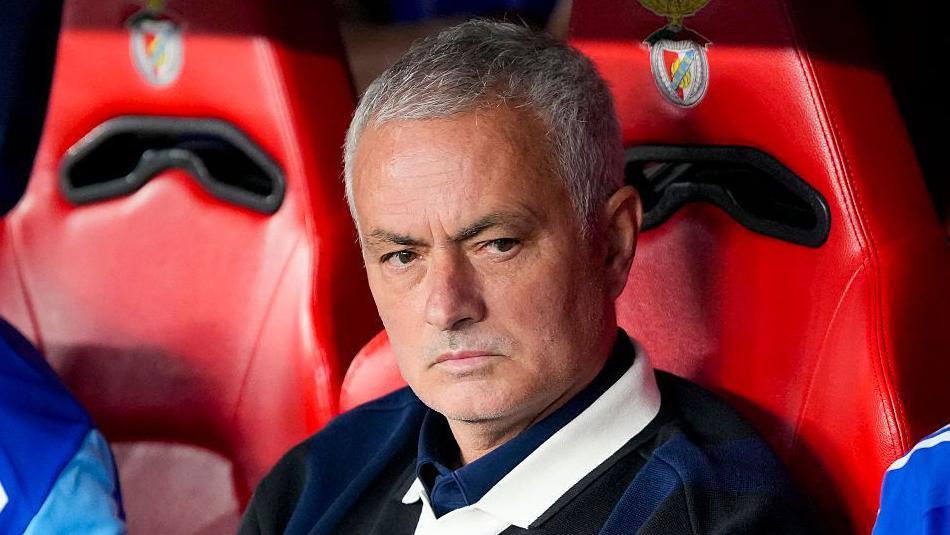Mourinho’s Sensational Benfica Return: A Homecoming on the Horizon?
The world of Portuguese football is ablaze with speculation as José Mourinho appears on the cusp of a dramatic return to Benfica, the very club where his illustrious managerial career first took flight over two decades ago. This potential reunion follows Benfica’s recent decision to part ways with Bruno Lage in the wake of a stunning 3-2 Champions League defeat against Qarabag – a result that saw their two-goal advantage evaporate at the Estádio da Luz.
Club president Rui Costa has openly stated the club’s ambition to secure a proven winner capable of reigniting their faltering campaign, telling reporters that the ideal Benfica coach must embody the club’s prestige and deliver the championships their passionate fanbase demands. While stopping short of naming potential candidates, sources indicate that advanced negotiations are underway to bring Mourinho back to Lisbon, mere months after his departure from Fenerbahçe.
The Champions League Defeat: A Catalyst for Change
Benfica’s European setback proved to be the decisive factor in bringing Lage’s tenure to an end. Failing to secure Champions League qualification against a relatively unfancied side intensified the pressure on the manager, especially at a club where domestic dominance and significant European impact are considered paramount. The timing of this decision adds a layer of urgency – Costa has made it clear that Benfica intends to appoint a new manager before their upcoming Primeira Liga match. Reportedly, Mourinho’s representatives are currently working diligently to finalize the contractual details.
Why Mourinho Could Be the Perfect Fit: A Tactical Masterclass Ready for Benfica?
The possibility of Mourinho returning to Benfica carries a significant weight of poetic history. While his first stint at the club in 2000 was brief, lasting only nine games and ending amidst internal tensions, it marked the beginning of something special. His subsequent triumphs with Porto (2002-2004), most notably the unforgettable 2004 Champions League victory, cemented his position as one of Portuguese football’s most successful figures. Today, with Benfica trailing behind Porto in the league standings, the club finds itself in desperate need of Mourinho’s renowned tactical discipline and unwavering winning mentality to revitalize their season.
European competition is a central consideration in this pursuit. Should Mourinho take the reins, he would face an immediate Champions League challenge, with a high-stakes match against Chelsea at Stamford Bridge looming. Further encounters against Newcastle and Real Madrid would also test the new manager’s skills. Mourinho’s undeniable pedigree in Europe’s premier competition, having lifted the trophy with two different clubs, presents Benfica with their best hope of navigating the new league-phase format successfully.
Navigating the Political Landscape: A Balancing Act
This managerial pursuit unfolds against the backdrop of Benfica’s upcoming presidential election. João Noronha Lopes, a leading candidate, has openly expressed his admiration for Sporting manager Rúben Amorim, potentially creating friction if he were to unseat Costa. The incumbent president, however, has adamantly defended the independence of his decision-making process. I haven’t campaigned because Benfica’s future transcends elections, he stated. My only concern is preventing this season from derailing. This demonstrates a dedicated commitment to Benfica’s success regardless of the upcoming political landscape.
Mourinho’s Homecoming Calculus: Nostalgia Meets Opportunity
For Mourinho, this move represents a unique blend of nostalgia and critical opportunity. Since his departure from Benfica in 2000, he has conquered the footballing landscapes of England, Italy, and Spain, amassing an impressive collection of 25 major trophies. However, mixed tenures at Tottenham and Roma, followed by a brief and uneasy spell at Fenerbahçe, have led some to question whether his methods still resonate in the modern game. A successful return to Benfica could serve to rehabilitate his reputation significantly, providing him with the chance to:
Rebuild on Familiar Ground: Revitalize one of Portugal’s most celebrated clubs, boasting an impressive 37 league titles.
Achieve European Redemption: Reestablish Benfica’s status on the continental stage after a disappointing Champions League group-stage exit.
Lead a Domestic Resurgence: Close the gap on rivals Porto and Sporting Lisbon in the Primeira Liga title race.
Complete his Legacy: Cement his connection with Portuguese fans, potentially setting the stage for a future role in international management.
High Stakes for All Involved
Benfica’s gamble carries inherent risks. While Mourinho undoubtedly brings media attention and tactical prowess, his recent track record of short, sometimes volatile, tenures contrasts with the club’s preference for managers who can oversee long-term projects. The club must carefully weigh the potential benefits of short-term stability and immediate success against Mourinho’s well-documented ability to deliver silverware, even amidst chaotic situations.
For Mourinho himself, this may represent his last chance to lead a major European club. With Benfica’s resources, talented academy, and passionate fanbase, the ingredients are there for him to orchestrate another chapter of trophy-laden success – provided he can adapt his confrontational style to the evolving dynamics of modern football.
As Lisbon prepares for this potentially seismic shift in managerial leadership, one thing is certain: Mourinho’s return would instantly transform Benfica into must-watch entertainment, both domestically and on the grand stage of European football. With fiery press conferences, insightful tactical strategies, and high-stakes clashes against former clubs Chelsea and Real Madrid, this appointment promises fireworks across Portuguese football.
